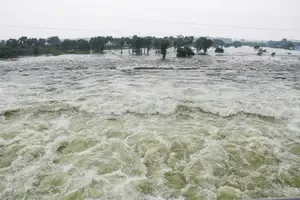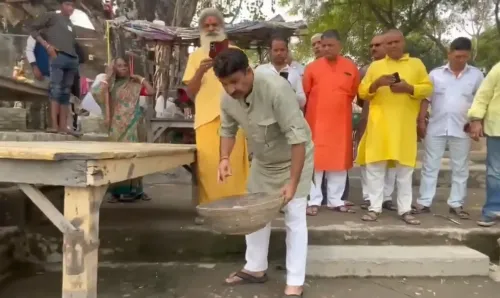Why is the public barred from visiting dams and lakes in TN?

Synopsis
Key Takeaways
- Tamil Nadu Water Resources Department has restricted public access to water bodies.
- The ban is a response to heavy monsoon inflows creating safety hazards.
- Over 90 dams and 14,141 lakes are under WRD's management.
- Security measures have been enhanced around key water sources.
- Residents are advised to stay cautious during the monsoon season.
Chennai, Oct 23 (NationPress) The Tamil Nadu Water Resources Department (WRD) has enacted a statewide prohibition on public access to dams, reservoirs, and lakes under its management due to ongoing heavy inflows from the intensifying northeast monsoon.
This precautionary measure aims to address safety concerns, as numerous water bodies are rapidly reaching capacity, necessitating controlled discharges from several critical dams.
Official data indicates that the WRD oversees 90 major dams and 14,141 lakes throughout Tamil Nadu.
With relentless monsoon rains affecting various regions of the state, inflows into reservoirs have surged significantly in districts such as Salem, Erode, Theni, Madurai, Tiruvannamalai, Coimbatore, and Tiruvallur.
To ensure structural integrity and avert potential overflow, authorities have begun releasing excess water from many of these dams. Traditionally, residents from surrounding areas would visit these locations with their families to observe the scenic water releases or to appreciate the sight of full reservoirs. However, officials caution that such visits have become increasingly perilous during the monsoon.
“A slight slip or a sudden surge in water levels can result in catastrophic incidents. Therefore, for safety reasons, the department has prohibited public access to dams, lakes, and other water bodies,” stated a senior WRD official.
The department has also sought police assistance for major reservoirs experiencing heavy inflows. Security measures have been heightened, especially around vital water sources supplying drinking water to Chennai, including Chembarambakkam, Poondi, Puzhal, and Cholavaram lakes. These four reservoirs, situated in the Kancheepuram and Tiruvallur districts, are now under continuous surveillance, with police personnel deployed in shifts to maintain security and prevent unauthorized entry.
Officials have installed signboards and barriers at the entrances of various dams, warning the public against entering restricted areas.
The WRD has collaborated with district administrations and police to ensure stringent enforcement of safety protocols. Residents in low-lying areas downstream of rivers like Adyar, Kosasthalaiyar, and Vaigai have been advised to remain vigilant, as sudden water releases from upstream dams could cause unexpected rises in water levels.
The department reiterated that this decision is purely preventive and urged citizens to fully cooperate during the ongoing monsoon season.









